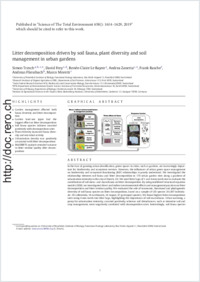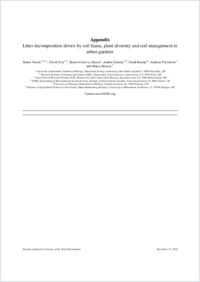Litter decomposition driven by soil fauna, plant diversity and soil management in urban gardens
- Tresch, Simon University of Neuchâtel, Institute of Biology, Functional Ecology Laboratory, Neuchâtel, Switzerland - Research Institute of Organic Agriculture (FiBL), Department of Soil Sciences, Frick, Switzerland - Swiss Federal Research Institute WSL, Biodiversity and Conservation Biology, Birmensdorf, Switzerland
- Frey, David Swiss Federal Research Institute WSL, Biodiversity and Conservation Biology, Birmensdorf, Switzerland - ETH, Department of Environmental System Science, Institute of Terrestrial Ecosystems, Zurich, Switzerland
- Le Bayon, Renée-Claire University of Neuchâtel, Institute of Biology, Functional Ecology Laboratory, Neuchâtel, Switzerland
- Zanetta, Andrea University of Fribourg, Department of Biology, Fribourg, Switzerland
- Rasche, Frank Institute of Agricultural Sciences in the Tropics (Hans-Ruthenberg-Institute), University of Hohenheim, Stuttgart, Germany
- Fliessbach, Andreas Research Institute of Organic Agriculture (FiBL), Department of Soil Sciences, Frick, Switzerland
- Moretti, Marco Swiss Federal Research Institute WSL, Biodiversity and Conservation Biology, Birmensdorf, Switzerland
-
25.03.2019
Published in:
- Science of The Total Environment. - 2019, vol. 658, p. 1614–1629
English
In the face of growing urban densification, green spaces in cities, such as gardens, are increasingly important for biodiversity and ecosystem services. However, the influences of urban green space management on biodiversity and ecosystem functioning (BEF) relationships is poorly understood. We investigated the relationship between soil fauna and litter decomposition in 170 urban garden sites along a gradient of urbanisation intensity in the city of Zurich, CH. We used litter bags of 1 and 4 mm mesh size to evaluate the contribution of soil meso- and macrofauna on litter decomposition. By using multilevel structural equation models (SEM), we investigated direct and indirect environmental effects and management practices on litter decomposition and litter residue quality. We evaluated the role of taxonomic, functional and phylogenetic diversity of soil fauna species on litter decomposition, based on a sample of 120 species (81,007 individuals; 39 collembola, 18 earthworm, 16 isopod, 47 gastropod species). We found highest litter decomposition rates using 4 mm mesh size litter bags, highlighting the importance of soil macrofauna. Urban warming, a proxy for urbanisation intensity, covaried positively, whereas soil disturbances, such as intensive soil and crop management, were negatively correlated with decomposition rates. Interestingly, soil fauna species richness decreased, with the exception of gastropods, and soil fauna abundance increased with urban warming. Our data also show that plant species richness positively affected litter decomposition by increasing soil fauna species richness and microbial activity. A multivariate analysis of organic compounds in litter residues confirmed the importance of soil fauna species richness and garden management on litter decomposition processes. Overall, we showed, that also in intensively managed urban green spaces, such as gardens, biodiversity of plants and soil fauna drives key ecosystem processes. Urban planning strategies that integrate soil protecting management practices may help to maintain important ecosystem services in this heavily used urban environment.
- Faculty
- Faculté des sciences et de médecine
- Department
- Département de Biologie
- Language
-
- English
- Classification
- Biological sciences
- License
-
License undefined
- Identifiers
-
- RERO DOC 324100
- DOI 10.1016/j.scitotenv.2018.12.235
- Persistent URL
- https://folia.unifr.ch/unifr/documents/307495
Other files
Statistics
Document views: 182
File downloads:
- pdf: 529
- Supplementary material: 323

